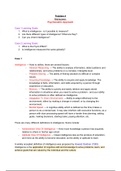Problem 4
Brainpower:
Psychometric Approach
Case 1 Learning Goals:
1. What is intelligence - is it possible to measure?
2. Are there different types of intelligence? What are they?
3. Can you inherit intelligence?
Case 2 Learning Goals:
1. What is the Flynn-Effect?
2. Is intelligence measured the same globally?
Case 1
Intelligence → Hard to define, there are several factors:
- Abstract Reasoning → The ability to analyse information, detect patterns and
relationships, and solve problems on a complex. Intangible level.
- Problem-Solving → The ability of finding solutions to difficult or complex
issues.
- Acquiring Knowledge → The ability to acquire and apply knowledge. The
knowledge is facts, information, and skills acquired by a person through
experience or education.
- Memory → The ability to quickly and easily retrieve and apply stored
information in situations when you need to solve a problem - and your ability
to solve problems is often defined as intelligence.
- Adaptation To One’s Environment → Ability to adapt effectively t o the
environment, either by making a change in oneself, or by changing the
environment.
- Mental Speed → A cognitive ability which is defined as the time it takes a
person to do a mental task. It may also interfere with executive functions, as a
person with slow processing speed will have a harder time planning, setting
goals, making decisions, starting tasks, paying attention, etc.
There are many different definitions to intelligence. Some include:
- Achievement View Of Intelligence → How much knowledge a person has acquired,
relative to others in his/her age cohort.
- Aptitude View Of Intelligence → Views intelligence less as the produce of education,
and more as the ability to become educated, as the ability or aptitude to learn.
A widely accepted definition of intelligence was proposed by Howard Gardner (1983) :
Intelligence is the application of cognitive skill and knowledge to solve problems, learn, and
achieve goals that are valued by the individual and the culture.
, Psychometric Approach → Measurement of psychological functions and process:
Theories Of Intelligence:
1. Francis Galton → Attempted to apply his cousin’s Charles Darwin’s evolutionary
theory to the study of human abilities. He suggested that intelligence was quantifiable
and normally distributed. In other words, he believed that we could assign a score to
intelligence where the majority of people fall in the average range and the percentage
of the population decreases the farther from the middle their score gets. He
measured the subtle sensory threshold, response speed, and believed intelligence
came from genetics.
2. James Mckeen-Cattell → Believed there were 2 clusters of mental abilities (The
Two-Factor Theory): crystallized intelligence and fluid intelligence.
a. Crystallized Intelligence → Learning from past experiences and learning,
situations that require crystallized intelligence include reading,
comprehension, and vocabulary exams. This type of intelligence is based
upon facts and rooted in experiences; it b ecomes stronger as we age and
accumulate new knowledge and understanding.
b. Fluid Intelligence → The ability to think and reason abstractly and solve
problems. This ability is considered independent of learning, experience, and
education. (E.g. solving puzzles and coming up with problem-solving
strategies. Both types of intelligence increase throughout childhood and
adolescence. However, fluid intelligence peaks in adolescence and begins to
decline progressively beginning around age 30 or 40.
3. Alfred Binet → Developed the first reliable intelligence test. Defined intelligence as
ability (including reasoning, memory, etc.) that is influenced by a number or factors.
a. Developed the Binet-Simon Scale which included 30 tasks that were
progressibe in their difficulty. Some of the easier tasks required students to
follow comments or repeat simple sentences; more difficult tasks from given
words or drawing images from memory. → The test yielded scores in terms of
mental age. Mental age: the chronological age that corresponds to a
particular level of performance.
b. The Stanford-Binet Intelligence Scale → Lew Terman (1916) and his
colleagues at Stanford University created the Stanford-Binet Intelligence
Scale by expanding and revising the Binet-Simon Scale. This scale yielded
scores in terms of intelligence quotients (IQ). The IQ is the mental age divided
by the chronological age and multiplied by 100. → IQ = (MA/CA)*100. The
test was used to identify kids whom were too slow for the regular classroom;
they wanted to measure the general ability. Also created during WW1, to
evaluate immigrants and army recruits.
4. William Stern → Came up with the IQ test based on Binet’s formula. Was used at the
time of WW1, to evaluate immigrants and army recruits.





